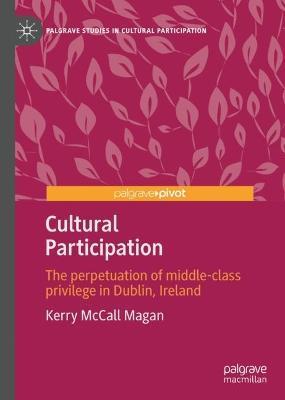Cultural Participation: The Perpetuation of Middle-Class Privilege in Dublin, Ireland

Cultural Participation: The Perpetuation of Middle-Class Privilege in Dublin, Ireland
This book provides a nuanced account of cultural competence, knowledge and skills illustrated in distinctive taste in the middle and upper classes in Dublin, Ireland (Bourdieu, 1984, 1986). It highlights how the development of cultural taste at a young age is linked to cultural participation in later life. Inspired by work that captures the textured social cartography of distinctive cultural taste (Bennett, Emmison & Frow, 1999; Bennett, Savage, Silva, Warde, Gayo-Cal & Wright, 2009), this research charts the changing nature of cultural participation in Dublin, Ireland and shows how cultural consumption has broadened from the narrow range of traditional high art forms towards one which grazes across the general register of culture. As elsewhere, this omnivorous, broad and pluralistic cultural palette has not altered patterns of distinction in cultural participation, rather it belies an emerging cultural capital profile - one where art form boundaries have collapsed but social boundaries and cultural distinction remains intact. Through interviews with two age cohorts (18-24yrs) and (45-54yrs) in Dublin in 2019, this research shows how the dominant class, through histories of cultural exposure have developed cultural taste and competence that is remarkably enduring. Reviewing available data on arts attendance and cultural participation in Ireland today, this text highlights how years of cultural familiarity allow individuals to exert a cultural dominance that facilitates class to be performed obliquely. It also demonstrates how existing surveys reinforce traditional ways of seeing with 'art' considered highbrow, formal and valued while culture is domestic, informal and less valued in the eyes of polity. This view informs Irish arts strategy and policy, ultimately reinforcing that 'ways of seeing' and policy perspectives, do matter (Berger, 1972).
PRP: 335.90 Lei
Acesta este Prețul Recomandat de Producător. Prețul de vânzare al produsului este afișat mai jos.
268.72Lei
268.72Lei
335.90 LeiLivrare in 2-4 saptamani
Descrierea produsului
This book provides a nuanced account of cultural competence, knowledge and skills illustrated in distinctive taste in the middle and upper classes in Dublin, Ireland (Bourdieu, 1984, 1986). It highlights how the development of cultural taste at a young age is linked to cultural participation in later life. Inspired by work that captures the textured social cartography of distinctive cultural taste (Bennett, Emmison & Frow, 1999; Bennett, Savage, Silva, Warde, Gayo-Cal & Wright, 2009), this research charts the changing nature of cultural participation in Dublin, Ireland and shows how cultural consumption has broadened from the narrow range of traditional high art forms towards one which grazes across the general register of culture. As elsewhere, this omnivorous, broad and pluralistic cultural palette has not altered patterns of distinction in cultural participation, rather it belies an emerging cultural capital profile - one where art form boundaries have collapsed but social boundaries and cultural distinction remains intact. Through interviews with two age cohorts (18-24yrs) and (45-54yrs) in Dublin in 2019, this research shows how the dominant class, through histories of cultural exposure have developed cultural taste and competence that is remarkably enduring. Reviewing available data on arts attendance and cultural participation in Ireland today, this text highlights how years of cultural familiarity allow individuals to exert a cultural dominance that facilitates class to be performed obliquely. It also demonstrates how existing surveys reinforce traditional ways of seeing with 'art' considered highbrow, formal and valued while culture is domestic, informal and less valued in the eyes of polity. This view informs Irish arts strategy and policy, ultimately reinforcing that 'ways of seeing' and policy perspectives, do matter (Berger, 1972).
Detaliile produsului









